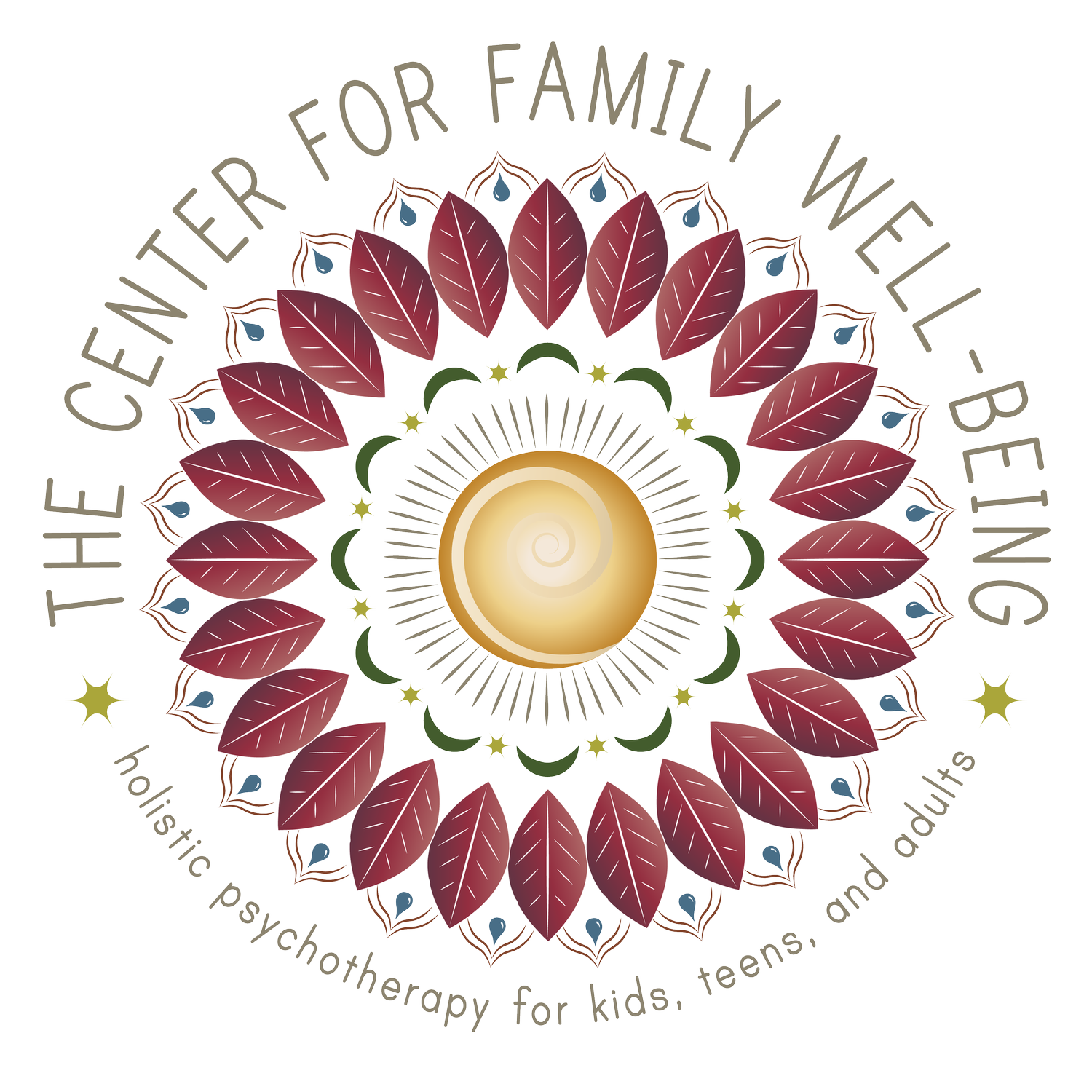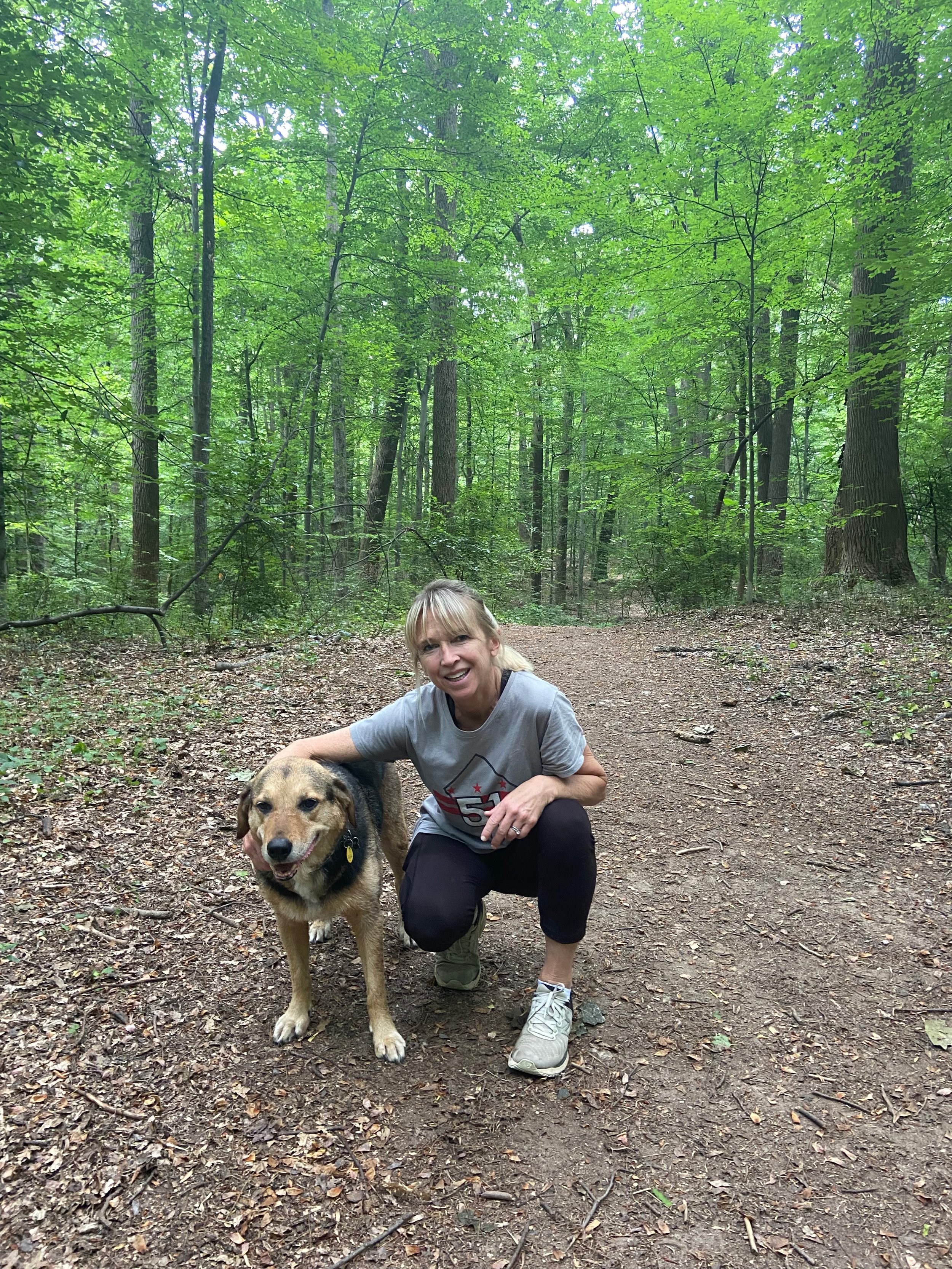Meet Lisa Oakley & Her Therapy Dog Manny!
Lisa and Manny pose for a picture during one of their therapeutic nature walks.
Lisa is a Senior Associate Holistic Psychotherapist at the Center. She and Manny have helped our clients feel happier, make lasting change, and grow their foundations of well-being for more than six years.
One of the things we — and countless kids, parents, young adults, and families — love about Lisa is her fresh take on Western psychotherapy and healing traditions. She seamlessly incorporates outdoor settings, therapy animals, play, and mindful awareness practices into her sessions to help clients engage and open up in new and transformative ways. For many people, having a therapist like Lisa who is willing to think outside of the box is a game-changer on their path to wellness!
We sat down with Lisa to talk about Manny and some of the other valuable tools and methods she's using at the Center.
Opening the Door to Outdoor Therapy
It's no surprise that after years of communicating and learning through screens, we are realizing that spending time outdoors is more crucial than ever — especially for kids. How have you seen your outdoor therapy sessions improve your clients' well-being?
"During the pandemic, everybody pivoted to virtual therapy. That was really hard for kids — especially those on the spectrum or who struggle with ADHD — who were already glued to screens at school. As an alternative, I began meeting clients outdoors at nearby Rock Creek Park to walk during our sessions. That alone was nourishing, as it gave us opportunities for pausing, mindfulness, and taking in nature, and being able to incorporate therapy into that time was amazing. What I found was that it was nurturing for everybody; everyone talked more and really opened up.
"Because it's been so beneficial, I still offer outdoor sessions as an option. Some clients meet me in the office, others prefer outdoors, and some it's a mix depending on the day or time of year."
Manny the Therapy Dog
Manny is like an unofficial mascot at the Center! Can you tell everyone a little more about Manny and his role with your clients?
"Manny comes with me to work almost every day! He's in the office and joins me on my outdoor walking sessions. He's a rescue dog, and just calm, relaxed, friendly, and chill. Having a therapy dog is a nice way to bring kids into therapy calmly, and he helps people open up, feel comfortable, and talk more."
For those who are afraid of or uncomfortable around dogs, how does Manny assist you in exposure therapy sessions?
"Some people come to me to overcome a debilitating fear of dogs. Sometimes I'll use Manny for exposure therapy, but I also use other therapy dogs to increase exposure and range. It's been really successful."
Help with Life's Biggest Transitions
We always say, "there's no one-size fits all at the Center," and you definitely embody this approach! Can you share more about the variety of people and challenges you treat?
"I enjoy working with people in a transition — I work with children, young adults, and families in different life stages. I see a lot of divorced families with children living in high-conflict households. For these children, therapy becomes a space to talk and feel safe, comfortable, validated. I also see adults who are making transitions in their jobs or relationships, as well as children and adults who are struggling with anxiety or depression. I like the mix!"
In addition to your nature-based and animal-assisted therapies, will you tell us about some of the other therapeutic paths you use in your daily practice?
"I specialize in Cognitive Behavioral Therapy (CBT) for children with anxiety, ADHD, and behavioral issues. When a child is dysregulated, they've lost control of their prefrontal cortex and they're operating in an emotional state and can be very disruptive or explosive. I work with these children to help them get in touch with their bodies and develop strategies and routines to manage their emotions and calm down. Then I incorporate parents into those strategies and they reinforce them at home. It gives the child a lot of control over the process when we work collaboratively, and we see progress quickly!
"I also incorporate play therapy and art therapy into a lot of what I do. Kids don't want to sit and talk nonstop — the young ones or even teenagers. We'll make art or play games while we talk. The results are similar to my outdoor walking therapy sessions: While they're engaged in a task or working with their hands, instead of just sitting and staring at someone, kids will open up more."
Boys In-Tune Group
You're the Center's Boys In-Tune Group guru. Tell us about this group and how it benefits young boys.
"Boys In-Tune is a summer group I host annually. It's about improving social skills, relationships, and friendships. This summer I'm hosting a group for middle school boys. This age group in particular had 2-3 years of their core developmental years interrupted socially by the pandemic. I want to help them open up, build confidence, and practice initiating and maintaining relationships. We play games that incorporate leadership skills and reading social cues — it's limited to just a few participants, so the boys feel comfortable. It's a fun group!"

